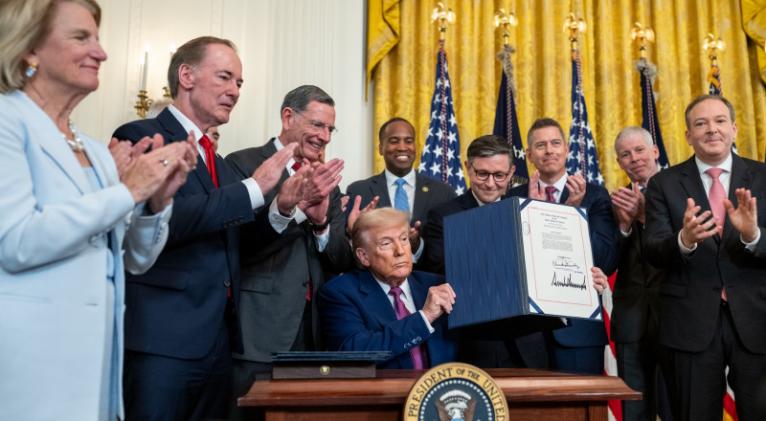Trump's 2026 Budget: A Blueprint Against the Poor, Minorities, Science, and the Environment
especiales

No document reveals a government's priorities more clearly than its budget proposal. President Trump's FY2026 discretionary funding request, submitted to Congress on May 2, outlines draconian cuts to non-defense spending (22.6% below 2025 levels) alongside a $43.8 billion increase for the Department of Homeland Security. The proposal eviscerates U.S. global engagement—eliminating foreign aid, peacekeeping missions, and cultural exchanges—while domestically targeting social programs, scientific research, and environmental protections with unprecedented severity.
Historical Precedents Shattered
The scale of these cuts finds few parallels in democratic governance:
-
Chile and Argentina's military regimes slashed public spending by 26% and 21% respectively post-coup.
-
Greece's austerity measures (2010-2017) and U.S. postwar drawdowns were crisis responses.
-
Thatcher and Reagan's neoliberal reforms pale in comparison.
Only Argentina's President Milei has attempted comparable restructuring in a democracy. As I've previously argued, such transformations typically require authoritarian conditions.
The Human Toll
1. Poverty Amplification
The budget dismantles:
-
Early childhood education (Head Start) and college access programs (Pell Grants)
-
Job training (Job Corps), senior employment aid, and school lunch programs
-
Low-income energy subsidies and homelessness assistance
Systematic evidence shows childhood poverty creates lifelong disadvantages. Temporary pandemic relief briefly reduced U.S. child poverty rates from 12.6% to 5.2% in 2021; its termination reversed all gains.
2. Public Health Crisis
Cuts to:
-
CDC funding amid a resurgent measles epidemic
-
Mental health/substance abuse programs
-
Clean water and lead abatement initiatives
"Even the wealthy cannot fully insulate themselves from epidemics," notes public health expert Brooke Nichols, who estimates 300,000 deaths—mostly children—from prior aid cuts.
3. Scientific Devastation
Eliminated or reduced:
-
Climate, agricultural, and biodiversity research
-
NOAA weather forecasting capabilities
-
23 agencies including National Endowments for Arts/Humanities
The dismantling of basic research—whose practical applications often emerge decades later (e.g., topological mathematics enabling modern computing)—represents an incalculable loss to human knowledge.
Political Calculus
Despite economic headwinds (Q1 2025 GDP contraction, rising inflation), Trump's base remains stable at ~45%. Exit polls reveal:
-
50% support among voters earning <$50k (27% of electorate)
-
51% among <$100k earners (59% of electorate)
Research by Kuziemko et al. suggests low-income voters may paradoxically support welfare cuts due to stigma aversion—preferring earned income over transfers. This insulates Trump from immediate backlash.
Authoritarian Drift
1. Manufactured Enemies
The administration conflates:
-
Undocumented immigrants
-
Legal permanent residents
-
Naturalized citizens
ICE's daily arrest quota (3,000) and military mobilization (20,000 National Guard requested) signal unprecedented escalation. Federalizing California's National Guard to enforce deportations breaches historical norms.
2. Corruption Normalized
Trump's open monetization of office—selling access, promoting personal crypto ventures, accepting gifts like Qatar's private jet—defies traditional corruption frameworks. As Jan-Werner Mueller notes, its brazenness disarms critics by eliminating the "revelation" dynamic that fuels scandals.
Breaking Point?
The human costs are becoming unavoidable:
-
Service Employees International Union (700k members) mobilized after president David Huerta's arrest
-
AFL-CIO (15M members) condemning enforcement actions
-
California threatening tax rebellion against federal overreach
Yet with GDP growth slowing (2.4% Q4 2024 → -0.2% Q1 2025) and inflation reaccelerating, the administration bets its base will tolerate erosion of public goods for perceived cultural victories. History suggests such trade-offs eventually collapse—but democratic safeguards may not survive the experiment.














Add new comment